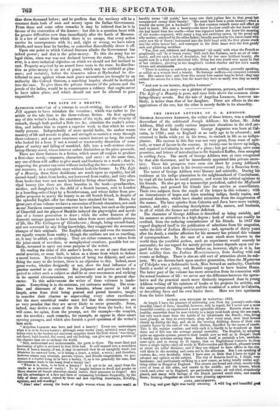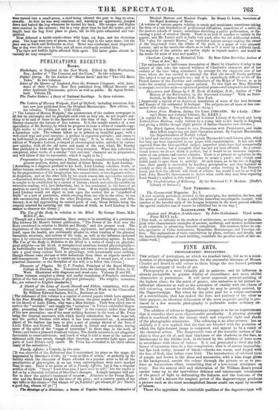descendant of the celebrated Joseph Addison : his father, Mr.
Joha Addison, filled with credit various important situations in the civil sere vice of the East India Company. George Augustus was born at Cal- cutta, in 1792 ; sent to England at an early age to be educated ; and returned to India while yet in his teens, to embark in life as an indigo- planter. His success in this line was not very great, from want of apti- tude, or want of favour in the seasons. At twenty-one he threw up indigo, and repaired to Calcutta in search of a place; but got nothing, save soma promises, and letters of introduction to Sir Stamford Baffles, then occupied in settling Java. The merit of George Addison was at once recognized by that able Governor, and he immediately appointed him private secre- tary. These fair prospects were soon cut short by young Addison's death ; which took place in his twenty-second year, by a Batavian fever.
The tastes of George Addison were literary and scientific. During his
residence at his indigo plantation in the neighbourhood of Cossimbazar, he read all the books he could procure, and wrote his critical opinions to his friends. He also got up a manuscript periodical, called the Mofussil Magazine, and pressed his friends into the service as contributors. These two subjects form the staple of the letters in this volume ; with an intermixture of hopes and fears touching indigo, family topics, and personal sketches, which have slender attraction from the suppression of the names. The later epistles from Calcutta and Java have more variety, matter, and stir ; embracing descriptions of life, nature, and business, in all of which the former are rather deficient.
The character of George Addison is described as being amiable, and his manners as attractive in a high degree ; both of which can readily be credited, from the enduring remembrance of his friends. In 1897 this regard displayed itself in the publication of selections from his magazine, under the title of Indian Reminiscences ; and, upwards of thirty yeaZs after his death, a similar affection for his memory has printed this volatile of correspondence. In the case of a man much more known to the world than the youthful author, such an experiment would scarcely be successful; for our regard for merely private letters depends upon our re- gard for the writer. The volume before us, however, alight as it is, has more solidity than the Indian Reminiscences, from dealing with real events or feelings. There is also an odd sort of attraction about its sub- jects. We are thrown back upon another generation, when the Mysteries of Udolpho was a fashionable book, Miss Seward an authority, Charlotte Smith a model of poetry, and Beattie supposed to have beaten Hums. The latter part of the volume has more attraction from its connexion with the actual business of life : we never saw the difference between the specu- lative and the practical much more distinctly impressed than in young Addison writing off his opinions of books or his projects for articles, and the same person sketching society and the troubles of a suitor in Calcutta, or describing Java and his own duties there. Here are two specimens from the latter island.
DUTCH AND ENGLISH IN BATAVIA: 1813.
At length I have the pleasure of addressing you from my journey's end—this dreadful island of Java; dreadful, however, only in report, for I never saw a more beautiful country, or experienced a more agreeable climate. Batavia alone is un- healthy, somewhat from its near vicinity to a large mud-bank along the sea-coast, but very much more from the habits of its hthabitants the Dutch; who, living most grossly, as they do everywhere, sleep after every meal, shut their houses closely up during the day, and sit in the evening drinking drams of their own country liquor by the side of vile dank ditches, dignified by the name of canals. This is the regular routine; and with such it is hardly to be wondered at that three out of five was the average annual mortality. The English, by adopting quite an opposite system, preserve their health now as well as in Bengal: there is hardly any sickness among them. Batavia itself is certainly a low, unwhole- some spot; and so strong its ill repute, that no Englishman ventures to sleep there a single night—they all reside at Weltevreeden and Ryswick, pleasant towns at about six miles' distance; and if they are obliged to have offices in the city, visit them in the morning and come out in the afternoon. But I am speaking of custom, &c., very decidedly, when I have seen so little that I.have no right to advance any opinion on the subject. The city of Batavia itself is, I think, very handsome; and particularly striking to a new comer, as being totally unlike any- thing either in Bengal or England. The streets are broad and clean, mostly with rows of trees at the sides, and canals in the middle; and the houses, which touch each other as in England, are particularly neat; all red-tiled, abundantly glazed, and =my with facings of the Dutch painted small slabs, and marble 'Boors; forming &wether an odd but very pleasing appearance.
JAVA AMUSEDIENTS.
The hog and goat fight was vastly amusing. A wild hog and beautiful goat
ware-turned into a small arena, a stool being allowed the goat to leap on °cm- sierially. At first he was very cautious, and, watching an opportunity, jumped down and butted the hog whenever he turned his back. His escapes and frights were -comical in the extreme; but in a very short time he had the better, and at length beat the hog from place to place, till he fell quite exhausted and van- quished. Next followed a battle-royal—three wild hogs, six dogs, and the victorious goat. The hogs were torn to pieces, most of the dogs in the same state; but the
ctwas as fresh and frolicsome as ever. Never wascombatant more impartial: or dog were the same to him, and all most studiously avoided him. he tiger and buffalo fights afforded little sport. The latter gains almost in- variably an easy conquest.



























 Previous page
Previous page